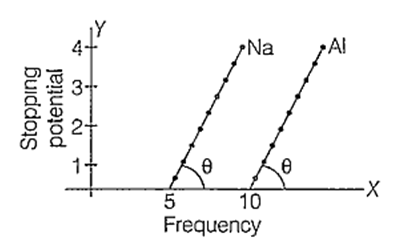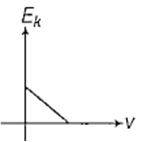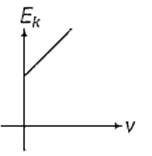 Multiple Choice Questions
Multiple Choice QuestionsThreshold wavelength for photoelectric emission from a metal surface is 5200 . Photoelectrons will be emitted when this surface is illuminated with monochromatic radiation from
1 W IR lamp
50 W UV lamp
50 W IR lamp
10 W IR lamp
From the figure describing photoelectric effect we may infer correctly that

Na and Al both have the same threshold frequency
maximum kinetic energy for both the metals depend linearly on the frequency
the stopping potentials are different for Na and Al for the same change in frequency
Al is a better photo sensitive material than Na
When light of wavelength 300 nm falls on a photoelectric emitter, photoelectrons are liberated. For another emitter, light of wavelength 600 nm is suffcient for liberating photoelectrons. The ratio of the work function of the two emitters is
1 : 2
2 : 1
4 : 1
1 : 4
Maxium velocity of the photoelectrons emitted by a metal surface is 1.2 x 106 ms-1. Assuming the specific charge of the electron to be 1.8 x 1011 C kg-1, the value of the stopping potential in volt will be
2
3
4
6
Which one of the following graph represents the variation of maximum kinetic energy (Ek) of the emitted electrons with frequency v in photoelectric effect correctly ?




A and B are two metals with threshold frequencies 18 x 1014 Hz and 2.2 x 1014 Hz. Two identical photons of energy 0.825 eV each are incident on them. Then photoelectrons are emitted by (Take h = 6.6 x 10-34 J-s)
B alone
A alone
neither A nor B
both A and B
The electromagnetic theory of light failed to explain
photoelectric effect
polarisation
diffraction
interference
When a piece of metal is illuminated by a monochromatic light of wavelength λ, then stopping potential is 3Vs. When same surface is illuminated by light of wavelength 2λ, then stopping potential becomes Vs. The value of threshold wavelength for photoelectric emission will be
4λ
8λ
6λ
The maximum kinetic energy of emitted electrons in a photoelectric effect does not depend upon
wavelength
frequency
intensity
work function
The amount of energy released when one microgram of matter is annihilated is
25 kWh
9 × 1010 kWh
3 × 1010 kWh
0.5 × 105 kWh
